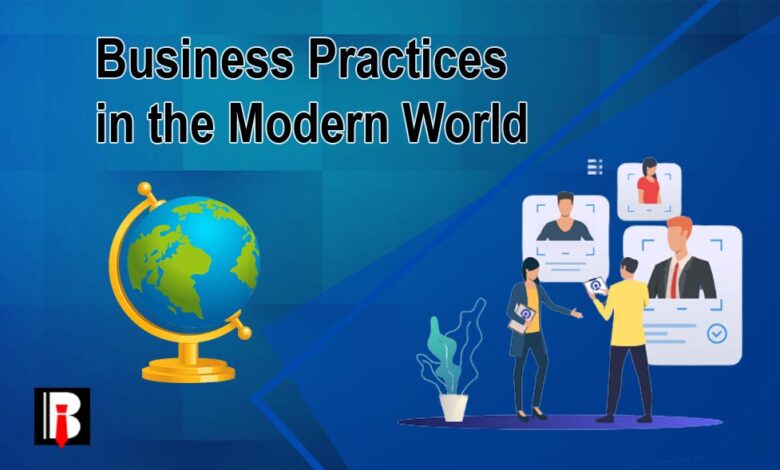Role of Ethical Business Practices in the Modern World

Today, with business landscapes changing constantly and global connections growing, ethical business practices have gained importance. Businesses and people follow “business ethics” in the workplace, which consists of moral rules and ideals. In addition to following the law, ethical business practices go beyond that.
Principles like integrity, justice, transparency, and social responsibility are emphasized. This blog will focus on the relevance of ethical business behavior in the modern economy.
Quick Shortcut Headlines
How Does the Company View Business Morality?
Businesses, whether large or small, have a significant effect on the global community. All of society, not just their customers, feels the effects of their actions and decisions. Companies with foresight understand that a firm dedication to operating ethically is no longer a nice-to-have but rather a requirement.
Companies that are forward-thinking recognize that business ethics are about trust, long-term connections, and business success. Ethical businesses make it a point to be honest in their dealings, treat their employees with respect, and follow environmental standards.
These standards not only improve the work environment and inspire creativity but also attract buyers and investors who share the same beliefs.
What Does Ethical Business Mean?

When it comes to business ethics, it’s not enough to just follow the rules. It also requires choosing the ethically right option despite the difficulty. Unethical business people put profits above principles. Customers, workers, partners, and the community are considered when making decisions. This method needs guts because doing the right thing isn’t always easy.
For example:
A good businessperson wouldn’t use misleading promotions because they value honesty with customers. They would also work to ensure that everyone feels comfortable and welcome in the workplace, with the knowledge that many points of view are necessary for the creation of innovative solutions.
Why are Business Ethics Important?
Business ethics were once considered a luxury but are now recognized as fundamental to running a successful company. Integrity in business dealings is vital for more than simply moral or psychological reasons.
They are also necessary due to the fact that they are an essential factor that impacts the reputation, connections, and future success of a business. Here, we examine the compelling case for why ethical business practices are more important than ever.
Improving Your Reputation and Trust:
A company’s image can be its greatest asset or greatest risk in a time of easy information and social media. An honest organization builds a good reputation. Always acting ethically fosters trust with consumers, investors, employees, business partners, and the public. Trust builds brand loyalty, word-of-mouth, and goodwill, which can weather an unpredictable economy.
Keeping Success Over Time:
Focusing too much on short-term advantages may minimize corporate decisions’ larger repercussions. However, ethics help a corporation make long-term growth decisions. Business ethics-focused actions are more likely to benefit the company and society in the long run. It makes people feel stronger, and the community lasts longer and succeeds.
Getting Stakeholders by Having Values in Common:
The modern customer is clever, powerful, and concerned about the globe. No longer satisfied with goods or services, people demand real engagement with their favorite businesses. Customers with strong values value ethical business operations. Customers, investors, and business partners share the same values as companies that do the right thing.
This alignment creates a beneficial ecosystem where stakeholders care more about corporate mission and success.
Lessening the Chances of Legal and Reputational Problems:
Ethical behavior prevents legal and moral issues. Businesses can avoid costly legal conflicts and damage to their reputations by following ethical and industry standards. Ethical business practices promote honesty, which helps avoid scandals and debates that damage a company’s brand and financial position.
Creating a Good Work Environment:
Any firm relies on its employees, whose motivation, morale, and productivity determine its success. Ethical business practices promote a healthy workplace where employees feel appreciated, respected, and aligned with the company’s mission.
Workers are more likely to work hard, innovate, and help the firm succeed if they know their CEO values justice, equality, and ethics.
Showing a Sense of Social Responsibility:
Organizations affect communities, economics, and the environment as part of society. Ethical business operations indicate social responsibility and a desire to improve the world. Local community support, environmental protection, and human rights awareness benefit society and demonstrate a company’s commitment to more than just profit.
Advantages of Doing Business in an Ethical Way:
Gains Credibility:
Ethics increase stakeholder trust. When customers and business partners believe a firm is doing the right thing, its image improves, leading to brand loyalty and excellent recommendations.
Long-term Sustainability:
Companies that prioritize ethics make long-term decisions. Sustainable methods benefit the environment and sustain the firm.
Attracts Stakeholders:
Organizations with strong ethics attract customers, investors, and workers who share their values. People are usually drawn to companies that believe and value the same things they do.
Lessons Legal Risks:
Ethics is more than just doing what’s legal; following ethical principles can reduce the risk of legal problems and save companies money and their reputation.
Employee Engagement:
Employees are happier and more driven when the workplace is ethical. When employees believe their organization has a mission, they are more engaged and work harder.
Tips for Business Ethics:
- Behave in an honest way from the top down.
- Make sure that all workers are always aware of ethical issues.
- Make a place where it is safe to report unethical behavior.
- Keep talking about business methods in an open way.
- Make sure that everyone is treated fairly.
Final Thoughts:
Business ethics are now essential in a world where information spreads at the speed of light, and individuals are more connected than ever. Organizations that prioritize ethics build trust, longevity, and long-term success. A style of thinking called business ethics directs choices and actions toward a better future for everyone. We can transform the modern world using our individual and collective choices. To make tomorrow better and more responsible, make ethical decisions.




